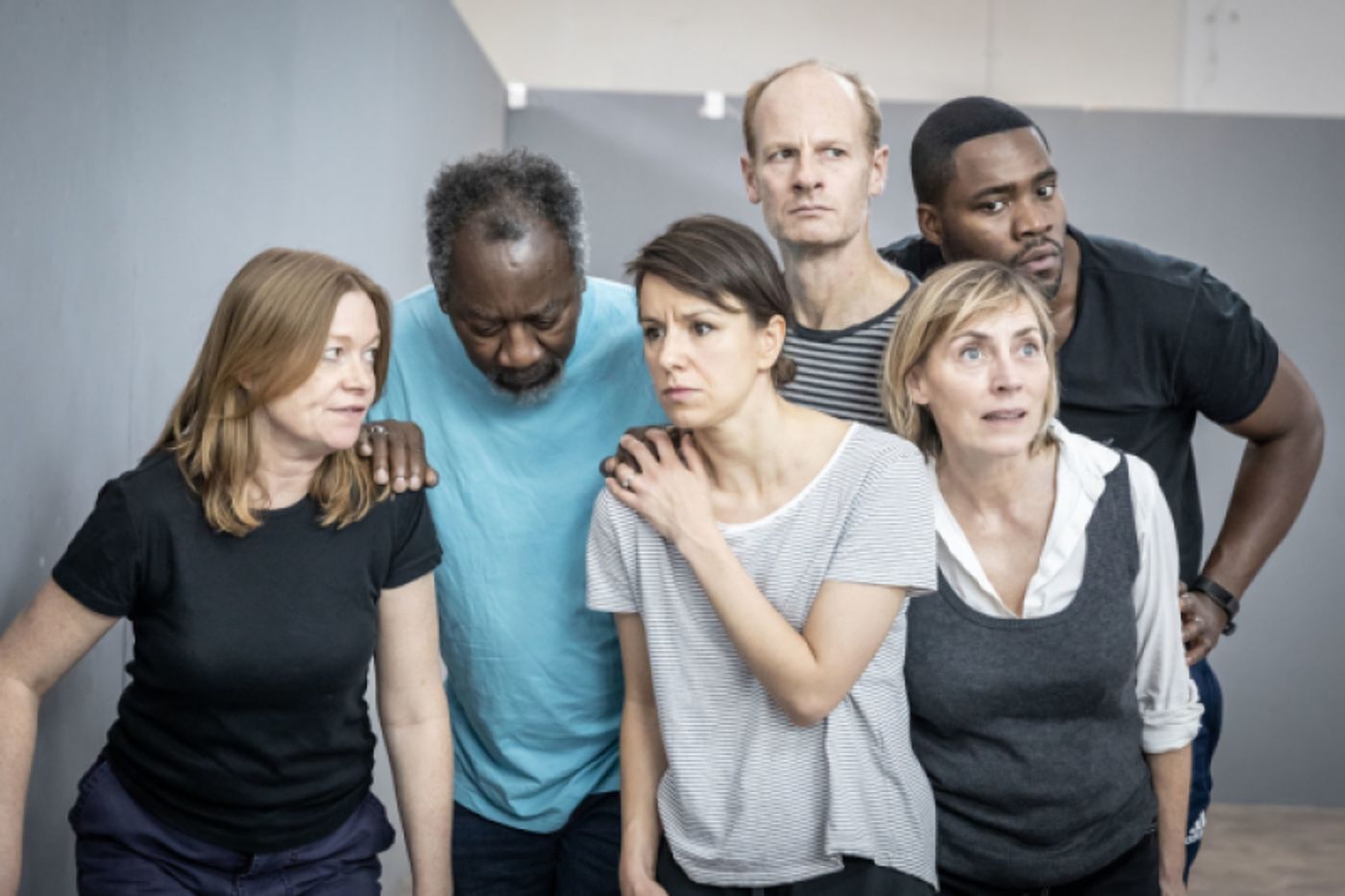Interview: Saskia Reeves Talks THE TRAGEDY OF KING RICHARD THE SECOND

Previews are underway for The Tragedy of King Richard the Second, Joe Hill-Gibbins' latest production to play the Almeida. Though this marks actress Saskia Reeves' first time performing at this theatre, it is not her first foray into Shakespeare.
Discussing how relevant the play is to not only our time but this very week, Saskia also shares the joys of working on Shakespeare with Cheek by Jowl's Declan Donnellan and Joe Hill-Gibbins, "directors who have real imagination and love the text and storytelling".
What is your earliest memory of theatre?
My father was an actor and he was in the original production of Andrew Lloyd Webber and Tim Rice's Joseph and the Amazing Technicolor Dreamcoat.
I remember being a kid and following him around with that production to the Edinburgh Festival, but also the Young Vic. (I would make any excuse to go and meet him after the show with my Mum, because there were loads of choir boys in the production!)
The whole backstage thing was always so exciting, to get to go back there and see Dad in whatever he did and to meet actors. And I still get that real buzz when I go backstage today.
Was there a moment that really solidified, "This is where I belong"?
We did a lot of drama locally as kids, me and my sister. Then I saw the original A Chorus Line in the Broadway transfer to the West End, when I was young. That's when I thought, "I really want to be an actor".
And that journey to becoming an actor, was it the stage or screen which came first for you professionally?
So I went to drama school very young and I did a lot of theatre. It was in my mid-twenties that I switched to film and appeared in my first feature.
But I was always very determined that I would be in it for the long haul, so I saw theatre as a real place for learning. There's nothing like being on stage with a live audience. But film has its own magnificent beauty and difficulties, which I also love very much.
My fantasy though is always to do a bit of both.

Richard the Second
So doing the live broadcast of King Lear from Shakespeare's Globe last year, that was kind of a dream then!
Yes! I still remember the first one I did with Complicité. We did A Disappearing Number at the Barbican, and it made for such an exciting atmosphere.
And with King Lear last year, my father who's disabled now wasn't able to come up to London to see it. So he saw it in Torbay in his wheelchair, which was amazing. I was very excited to be playing Kent in that production, so it was great he got to see it.
Talking about Shakespeare, what was your first experience with him? On page or on stage?
Well I joined a company called Cheek by Jowl in the 80's and we did A Midsummer Night's Dream. Declan Donnellan is a very clever director and a wonderful theatre-maker, and I have never laughed so much in a rehearsal room! I thought, "I can't believe I'm laughing this much...and it's Shakespeare!" That was a big eye-opener for me.
I also did Much Ado About Nothing with him and the same thing happened. It's wonderful when you do Shakespeare with directors who have real imagination and love the text and storytelling.
And you're now working with Joe Hill-Gibbins on Richard II. How familiar were you with the play?
Not at all, actually. But the original text has been cut and shaped to suit the way Joe and Jeff James our dramaturg wanted to tell the story.
It's mostly in rhyming couplets now; there's no prose in it, which is unusual. But it's an extraordinary piece of work and there are many words and phrases you see and hear in our vernacular today. You'd think that rhyming couplets would make it very old fashioned and stuck, but it's got this brilliant lightness as well.
I really grew to love the play. That first week, I think I wasn't too sure about it but by the second week, I thought, "This is really brilliant." Difficult though, because it's quite masculine, it doesn't have a love interest or the obvious comedy I've enjoyed in Shakespeare's other plays.
.jpg?format=auto&width=1400)
The Tragedy of King
Richard the Second
So it's your first time doing the play and your first time performing at the Almeida?
It is, yes. (And hopefully not the last!)
Plus, I only live down the road so I go a lot. I'm a huge fan of the Almeida, always have been. It's a beautiful, intimate theatre.
Can you tell us a bit about who you play?
So I have four characters: Mowbray, Bushy, Green and the Duchess of York. Three of my characters are men and one's a woman. It's very sort of fluid, if you see what I mean.
Mowbray is one of the characters to open the show and help set up this world. In the original, it seems to be one of reputation and power...
Yes. The play opens with a fight about the murder of the Duke of Gloucester, King Richard's uncle, between myself and Bolingbroke. And Mowbray is totally loyal to the king he's not going to admit in any way that perhaps King Richard was involved in this crime.
His reputation and his loyalty to the king and his family is uppermost to him. In that time, the Dukes were very powerful. So Mowbray was a powerful Duke and if I fought, I could take out young Bolingbroke, and that could shift the power in the country as well.
It's very complicated and interesting, this first argument in the play. It shows lots of things about my character: it shows Richard changing his mind, it shows Bolingbroke sticking his neck out. All these things are beginning to destabilize the status quo early on.
Another of your other characters gets a scene very close to the end, the Duchess of York. Her world is very much destabalized by then, right?
%20and%20cast_%20Photo%20credit%20Marc%20Brenner%20(4).jpg?format=auto&width=1400)
The Tragedy of King
Richard the Second
Yes. It's interesting and Shakespeare often does this, he brings in this second story line. But this one is brought in right at the end, in the way that we've done it. So suddenly the audience is presented with new characters and new dynamics, which is refreshing.
In rehearsals, I realised that that scene isn't about the life of her son; it's the life of their family. If you take our son away and we only have one son, we're screwed. We'd have no future, that's our bloodline gone. Our history is gone. So she is fighting for her future as well as her son's life.
It's also interesting to think of it as that relationship between the Duke and Duchess. She's thinking, "I'm not going to let you mess this up, because of your ridiculous obsession with doing the right thing". She knows that he's messing with their lives. If their family goes down, someone is always waiting in the wings to move in, to take over. There's always a jostling of position and power in this world.
And how would you describe that world of Joe's production?
It's closed in. It's stark. It falls into chaos, total chaos. So things get messier and messier, and muddier and bloodier as the play goes on.
By the very last scene, Bolingbroke says to Northumberland, "What news?" and they say, "Well, we've brought you the heads of X and Y". And the audience really knows that people are having their heads chopped off. Our production has a real visceral impact.
There's also an imaginative impact too and it does demand something from the audience. We don't have wigs and costumes and props, so we are asking a lot of them. But it is clear. And Simon Russell Beale and Leo Bill are fantastic actors, with such a command of the text. And Joe's a wonderful director: he's very good at focusing the text, knowing what's happening and what needs to happen next.
It's really exciting, the way the text and the edits lift things. It's different and energetic from beginning to end. Therefore, other things are allowed in, so you find yourself thinking about things that the play can relate to today.
On that, what themes do you think will resonate with audiences today?
.jpg?format=auto&width=1400)
The Tragedy of King
Richard the Second
Obviously with politics right now, it does speak to Brexit. People are divided. Who are we aligned to? What does this country mean to us now? Who's failing? Who's actually succeeding (if anyone at all)? That is extremely relevant to the dramatic world and our world today.
I mean those are power struggles we've seen this week, with Theresa May's vote.
Absolutely. You become a king, a leader and you're still not safe. Leo and I were actually talking about this to Joe the other day. Bolingbroke is finally king and yet his freedom goes. He has to sort out all these things, domestic problems and everything. He can't sleep. It's not what you think it is any more.
And I suppose you might think about that with May. "Uneasy lies the head that wears the crown". Who'd actually want to do her job?
The Tragedy of King Richard the Second at the Almeida until 2 February, 2019
NT Live broadcast into cinemas around the world on 15 January, 2019
Photo credit: Marc Brenner
Videos

